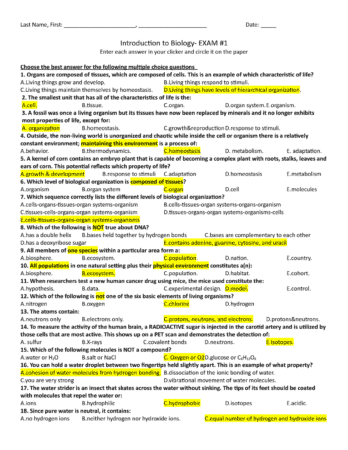
Advantages of AP Biology Past Papers
Advantages of AP Biology Past Papers
AP Biology past papers are a great way to improve your test-taking skills. You can use them to practice for the AP exam. You can also look for practice questions that are relevant to your upcoming exam. This will give you an idea of what to expect on the day of the test. You may also come across questions that are not on the AP biology test. However, you can avoid this by using AP Biology past papers.
AP Biology past papers can help you with your test-taking skills
The AP exam will consist of two sections, each with 90 questions. The first section will contain 120 multiple-choice questions and the second section will include 6 free-response questions. Both sections are timed to allow for analyzing answers quickly. By looking at these past papers, you can make sure that you are ready for the exam.

AP Biology past papers can also help you analyze the test questions and see what mistakes you might be making. While the AP exam will include a mixture of official and unofficial tests, students can use them to determine how well they’ve studied certain parts of the course. Using the past papers can help you prepare for the actual AP exam by helping you prepare for particular units. In addition to using past papers, you can practice specific sections of the course. This way, you will be better prepared for the actual test day.
The most important advantage of AP Biology past papers is the fact
that they give you an idea of how the exam will be scored. This is crucial because the AP exam is much more difficult than other AP courses and is more demanding than other exams. That’s why preparing with AP Biology past papers is essential. By analyzing real-world questions, you will be able to maximize your chances of scoring well on the exam.
AP Biology past papers also help you study for the exam. In addition to practice questions, you can also study by reviewing AP Biology curriculum. The new AP biology test is divided into two sections. The first section consists of 60 multiple-choice questions, while the second section is made up of six free response questions. Despite these differences, the test is still the most challenging in the AP course. As a result, you’ll need to know the content of the test before you sit for the exam.
AP Biology past papers can be useful in preparing for the test
Not only can they help you answer the questions correctly, but they can also help you learn more about the exam itself. The test will be three hours long, with each section containing 120 multiple-choice questions. Each section will be broken into three divisions. The first section will be divided into four sections, which will contain three essays each. The second section contains questions relating to the AP biology curriculum.
AP Biology past papers are an excellent way to get a feel for the test format. This test is divided into two sections, with Section I consisting of 120 multiple-choice questions. There are also four free response questions. Unlike the AP biology curriculum, this exam is a challenging and demanding test. While AP Biology past papers can help you prepare for the exam, they are not a perfect substitute for a real-world exam.
AP Biology past papers are also a great way to learn about the AP biology curriculum and test
The free response section of the AP test is considered to be the most challenging part. While you can ask your teacher for a practice test, you can also study AP Biology past papers online. These past papers can help you prepare for the AP exam. If you take AP tests, you will need to know about how the questions are organized.
AP Biology past papers can help you prepare for the exam by giving you an idea of how the test is structured. The practice test will also help you know which questions are common and which ones are not. It will also be helpful to familiarize yourself with the various topics in AP biology. The test is a difficult test and you may not be able to answer all of them correctly. Fortunately, there are plenty of practice tests online.
